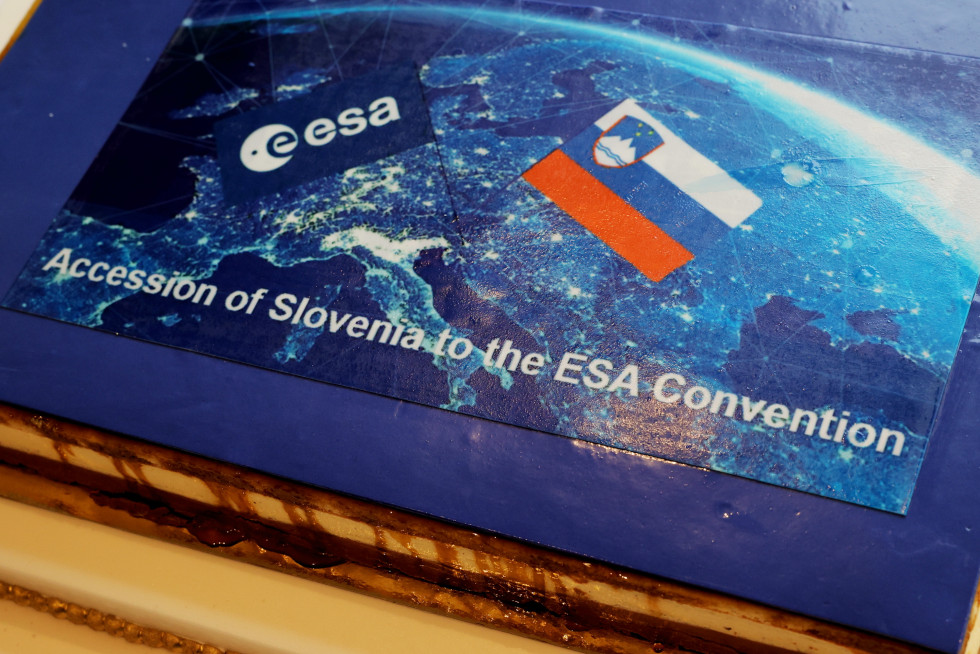Full ESA membership opportunity to develop technologies benefiting life on Earth
The vision is to invest not only in the development of space technologies, but also in innovations that benefit life on Earth.
Economy Ministry State Secretary Matevž Frangež says full membership will open up a number of opportunities to grow the Slovenian space sector and develop technological innovations.
Investment in these technologies being extremely high, state support is crucial. "Our vision is not just to develop technology that will be useful in space, but to invest for these innovations and technologies to produce a range of civilian applications that will improve our life on Earth."
Space technologies are not just about exploring distant planets and galaxies. For decades, they have been shaping the world in ways we are often unaware of. One such is earth observation satellites.
They enable accurate weather forecasting, monitoring climate change, natural disaster warning, and monitoring and analysis of urbanisation, farming and natural areas. They also enable navigation and the establishment of communication networks in the most remote places, Iztok Kramberger, head of Laboratory for Electronic and Information System at the Maribor Faculty of Electrical Engineering and Computer Science, explains.
Slovenia is emerging as a major player in Earth observation. Owing to the technology developed at the Maribor laboratory in cooperation with SkyLabs, Slovenia is among leading countries, especially in the development of powerful miniature satellite systems.
The lab's research work in cooperation with ESA also includes the development of technologies to address global challenges such as the protection of natural resources and environmental sustainability.
"SkyLabs is currently developing sensor systems for plastic identification in a major European international project in collaboration with Slovenian companies Surovina and Gorenje, and we have also started developing a completely new sensor technology for monitoring microplastics in water sources, which is a key tool in the fight against pollution," Kramberger says.
In collaboration with ESA, Slovenian researchers have also developed a smart sensor, originally designed for the Slovenian Trisat satellite, which allows Gorenje washing machines to identify the type of laundry and adjust the programme.
This leads to lower energy and detergent consumption, increasing the efficiency and sustainability of household appliances. "Suitable technological solutions are being sought to enable the mass production of such a smart sensor," says Kramberger.
Slovenian scientists working in biomedicine and environmental physiology are also developing solutions relevant to people's health. The Laboratory of Gravitational Physiology at the Planica Nordic Centre is studying the effects of weightlessness and extreme conditions on the human body.
Experiments include simulations of weightlessness and research on muscle mass loss, which is important not only for astronauts on long-duration missions in space, but also for solving health problems on Earth. The centre also has one of only three ESA human centrifuges available for research.
Despite the strong applicability of space technologies, basic research at ESA remains crucial. For example, the Ljubljana Faculty of Mathematics and Physics is running a project as part of the Gaia mission to study specific types of stars in order to accurately map the over one billion stars in our galaxy.
This research is contributing to better understand the universe and to prepare for future missions, such as Gaia-NIR, which is expected to fly into space in ten to 15 years' time to make even more precise observations.
Tomaž Zwitter from the Ljubljana faculty says an important aspect of the project is the involvement of students. "Currently, we have three master's students involved, who are processing the data and gaining valuable experience."
Slovenia has been cooperating with the ESA since signing the the Cooperation Agreement in 2009. It strengthened its cooperation in 2016 by signing an associate membership agreement. By ratifying the agreement on full membership this year it took the last step towards full integration into ESA.
The membership gives the country voting rights, the possibility to participate in two key programmes and increased opportunities for development and international cooperation. All this opens up new opportunities for companies, institutes and universities, according to Frangež.
He sees full membership as a recognition of Slovenia's success in "building a very promising and dynamic space sector in a very short period of time".
In the eight years as an associate member, 30 Slovenian partners have signed 114 contracts worth EUR 42.1 million with ESA, a figure that is expected to reach EUR 50 million by the end of 2024. The geographical return, which is ESA's measure of a country's performance, is higher than 1 for Slovenia, which means the country is absorbing more than 100% of the funds invested.
Full membership also brings additional financial obligations. The membership fee will increase from €500,000 to approximately €2.8 million. In addition, the state will pay a one-off amount of €1.7 million on joining as a full member.
Source: STA


